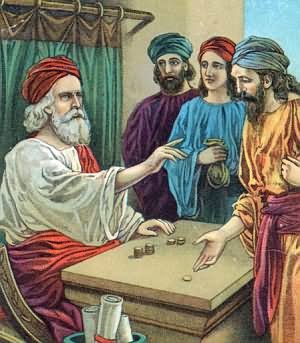This parable is taken from the gospel of Matthew 13:44.
Although this parable sounds strange to us, it would sound perfectly natural to people in Palestine in the days of Jesus, and even to this day it paints a picture which people in the East would know well.
In the ancient world there were banks, but not for ordinary people. Ordinary people used the ground as the safest place to keep their most cherished belongings. In the parable of the talents the worthless servant hid his talent in the ground, lest he should lose it (Matt.25:25). There was a Jewish saying “that there was only one safe repository for money–the earth”.
All the more the case in a land where a man’s garden might at any time become a battlefield. Palestine was probably the most fought over country in the world; and, when the tide of war threatened to flow over them. In that time it was common for people to hide their valuables in the ground, and flee from the war scene, hoping that someday they could return and regain what was hidden.
A parable is a earthly story with a heavenly (Kingdom of God) meaning. Therefore, when Jesus told this story, he told the kind of story that anyone would recognize in Palestine.
Although Palestine in the time of Jesus was under the Romans and under Roman law. In matters concerning the ordinary and small day to day things it was traditional Jewish law that prevailed. And similar with regard to hidden treasure the Jewish Rabbinic law was quite clear: “Whatever is found belongs to the finder. If a man finds scattered fruit, scattered money etc. these belong to the finder.” The point is that this man had a prior right to what he had found.
Second, even apart from that, when we are dealing with any parable, the details are never meant to be stressed; the parable has only one main point, and to that point everything else is subservient. In this parable the great point is the joy of the discovery that made the man willing to give up everything to make the treasure undoubtedly his own. Nothing else in the parable really matters.
What do I learn from this parable?
(i) The first lesson of this parable is, that the man found the precious thing, not by chance, but when he was performing his daily work. It is true to say that he stumbled all unexpectedly upon it, but he did so when he was going about his daily business. We can assume that he must have been going about his daily business with diligence and efficiency. The reason being he must have been digging deep, and not merely scraping the surface, in order to strike against the treasure.
When the mason is working on the stone, when the carpenter is working with the wood, Jesus Christ is there. Brother Lawrence (the practice of the presence of God), great saint and mystic, spent much of his working life in the monastery kitchen amidst the dirty dishes, and he could say, “I felt Jesus Christ as close to me in the kitchen as ever I did at the blessed sacrament.” The question that I need to answer is do I meet Jesus Christ in my daily chores. For a Homemaker do I meet Jesus Christ in the kitchen. For a lawyer do I meet Jesus Christ in the court. For a doctor do I meet Jesus Christ when I attend to patients.
(ii) The second lesson this parable teaches me, is that it is worth any personal sacrifice to enter the Kingdom. So, what does it mean to enter the Kingdom? When we read the Lord’s Prayer (Matt.6:10), we found that we could say that the Kingdom of God is a state of society upon earth where God’s will is as perfectly done as it is in heaven. So the question that I need to ask myself is how do I enter the Kingdom. I personally think to enter the Kingdom is to accept and to do God’s will. As sudden, as the man discovered the treasure, there may flash upon us, in some moment of illumination, the conviction of what God’s will is for us. To accept it may be to give up certain aims and ambitions which are very dear to me or to abandon certain habits and ways of life which are very difficult for me to lay down. It could also mean to take on a discipline and self-denial which are by no means easy, in a word, to take up our cross daily and follow after Jesus. I personally think It is indeed worth giving up everything to accept and to do the will of God.
In conclusion, wherever I’m placed, maybe performing the most mundane task as it may, I could find the most precious treasure “Kingdom of God”
In order to enter this “Kingdom of God”, I should be willing to make almost any sacrifice to enter the Kingdom of God.



